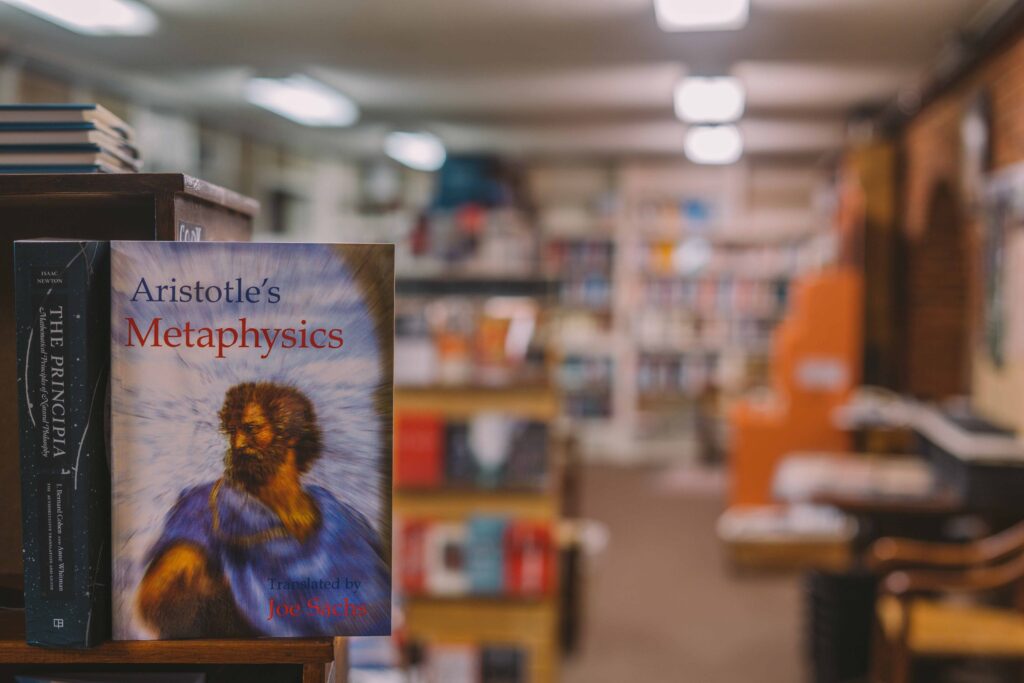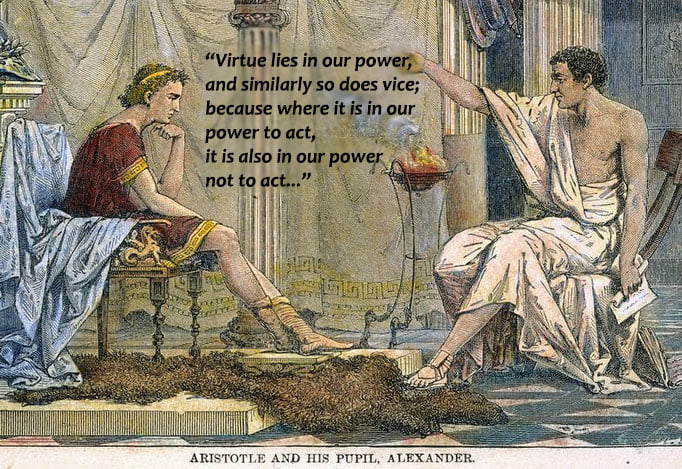Anybody can become angry-that is easy;
but to be angry with the right person, and
to the right degree, and
at the right time, and
for the right purpose, and
in the right way-
that is not within everybody’s power, and
is not easy.
Aristotle
Aristotle (384–322 BC) was the disciple of Plato. But, if Plato looks for the best, Aristotle suggests that we should not sacrifice good for the sake of the best as best is unachievable. Aristotle gives the best practicable State.

Plato is radical and looks for far-reaching changes, whereas Aristotle is conservative. He prefers only gradual changes.
We can see the influence of Aristotle’s ideas on the working of the British political system and in British political culture. Aristotle has propounded constitutionalism or the Rule of Law. Aristotle prefers to conserve the institutions. He is a functionalist. Functionalists are those who look at the functional utility of existing institutions.
Aristotle believed in the school of Teleology (School of Destiny). Aristotle also believes in reason.
Concepts of Aristotle: Theory of State , Theory of Slavery , Theory of citizenship, Theory of Justice, Theory of Constitution, Theory of Property, Theory of Revolution, Theory of Law
Theory of State
“Man is by nature a political animal“
Aristotle
In the above statement, Aristotle has established the importance of the State. Aristotle belonged to the Socratic tradition and was a critic of sofism. Sofism or sophists (Aristotle’s contemporaries) gave primacy to self-interest and undermined the importance of the state. For sophists, State is conventional or artificial.
But Aristotle proves that State is natural and necessary for virtuous life by stating that “man is by nature a political animal”. In other words, nature has made man in such a way, living in a state is required.
Aristotle suggests that there are three needs in a man. Firstly, basic or biological needs. To fulfill these needs, man has created the family. The second is secondary needs or need for social interaction and recognition. To fulfill these, man has created a village. The third is the highest order need or need for self-actualization and excellence. For this man has created State.
To prove that the State is natural, Aristotle tries to establish the origin of the State in the needs of man. Thus, he establishes that it is natural for a human being to be a member of a political community.
Hence, he also suggests that “one who can live without State is either beast or God, but he cannot be a man”.
According to him, one requires superhuman qualities to be able to live without the State. Chronologically, man has made the State, logically State makes the man.
Aristotle has established the State as the highest of all associations. No other association deserves the same level of respect that the State deserves. Other associations are not sufficient to fulfill all requirements of man. The life of man cannot be virtuous without the State.
Hence, he suggests that “a State comes into existence for the sake of life and continue for the sake of good life”.
Whether man by his nature a political animal and the State is an agency of excellence remains a matter of debate among political philosophers.
For classical liberals who believe freedom is important and the State curbs freedom, say that the state is “a necessary evil” whereas anarchists believe that a state is “unnecessary evil”.
Theory of Slavery
Slavery was an institute in ancient Greece. As per Aristotle, nature has created two types of men. Men who are physically strong and then some who are mentally strong. Slaves are the people who are physically strong but lack mental strength.
Citizens, the able greek men, are, on the other hand, possess the mental capacity and thus are useful for carrying out the affairs of the city.
Aristotle goes on to explain the usefulness of the institution of slavery. Slavery is important for the economies of the society as a physically strong man is responsible for doing the manual work. Moreover, slavery is important for the polity of the city as the citizens can get time to devote and contribute to the more important affairs of the society.
Slavery is important for the slave himself as he lives in the company of citizen and can one day develop qualities of the citizen. Aristotle’s conception of slaves is functionalist, and he asks the citizens to free the slaves if he develops the quality of a freeman.
Aristotle’s theory of slavery becomes the basis for justification for theories like benevolent despotism or white man’s burden.
Critical evaluation – In the age of democracy and human rights, institutions like slavery cannot be justified even on the grounds of utility. Aristotle is criticized for his justification of slavery.
In this context, we can quote Immanuel Kant. According to him, each man is an end in itself. No one ought to be treated as means to an end. Meaning that we should not treat other people as a utility against principles of ethics; not to treat others as objects.
” men cannot know each other till they have ‘eaten salt together’ “
Aristotle
Theory of Citizenship
Aristotle talks about citizenship in terms of duty rather than rights. The major duty of citizens is to participate in the affairs of the city-state. Aristotle excludes women, old men, children, and slaves from the duty.
Aristotle gives a very narrow theory of citizenship that cannot be accepted in the present age of democracy and human rights. However, Aristotle’s theory is appreciated for its emphasis on the necessity of participation in civic affairs.
“Happiness depends upon ourselves“
Aristotle
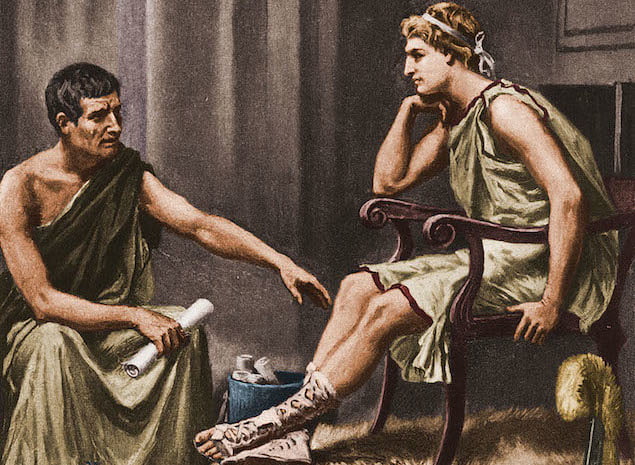
Theory of Property
Aristotle criticizes Plato’s theory of communism of property. Aristotle has justified the institution of private property but he understands certain evils, as it results in social inequalities, therefore suggests reforms.
According to him, the property earned by a person by the use of his labour is legitimate. Property if earned by exploiting someone’s circumstances is not legitimate. He has criticized the institution of money lending.
Aristotle analyses three systems of the property. The first system is that of common ownership and common use. Aristotle rejects this by stating that everyone’s property is no one’s responsibility. Such systems are never productive and also not good for the upkeep of the property. e.g. public park versus private garden.
The second system is that of common ownership but individual use. This is an impractical system, and if it is in practice, it will be very exploitative.
The third system is called the individual ownership and common use system. Aristotle calls it the best system as it is more productive. In it, there is better upkeep of the property. There is a source of motivation also. Aristotle suggests that a person should contribute to the well being of society.
It was one of the earliest manifestations of the idea of progressive taxation and welfare state. We see similarities in Aristotle’s theory of property and Gandhi’s theory of trusteeship.
“Educating the mind without educating the heart is no education at all“
Aristotle
Aristotle’s theory of Justice
“It is unjust to treat equals unequally, it is equally unjust to treat unequals equally”
Aristotle
Aristotle’s theory of justice is known as proportionate justice. The theory of justice is closely linked to the idea of equality. Aristotle has given two principles. The first principle suggests that states should treat equals equally. The two persons having equal merit and making equal contributions to society should be treated equally.
In case they are not treated equally, the person who feels that the State has discriminated against him may contribute to the revolt against the State.
The second principle suggests that it will be equally unjust if the State treats two persons with different abilities and contributions, equally. Aristotle is against absolute equality.
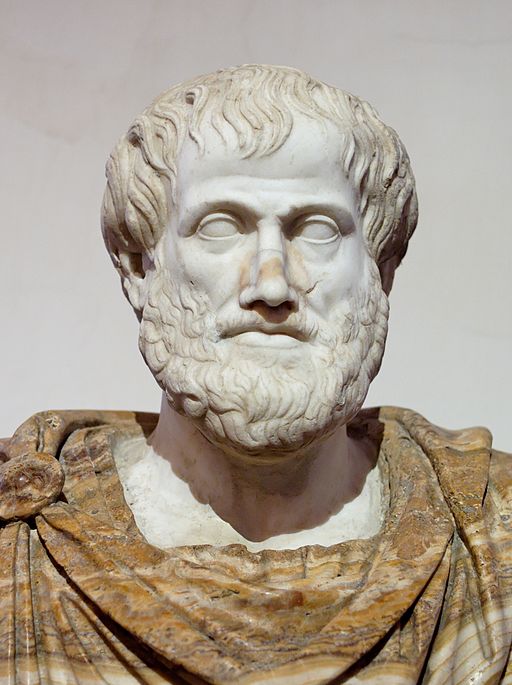
According to him, a state should recognize the different abilities and contributions of a person to society. We can link his theory of justice to his theory of slavery. As per him, those who have reason and courage ought to be treated as masters and those who lack ought to be treated as slaves. It will be an injustice if both are treated equally.
Aristotle propounds a meritocratic society. But in countries where historical injustices exist and an equal level playing field does not exist, Aristotle’s theory cannot be accepted.
Theory of constitution
Aristotle has written on various issues, but in his book “politics”, he has dealt with the theory of constitution in the most exhaustive manner. He was not comfortable with Plato’s ideal state, so he wanted to know what is the best practicable State.
To understand that, he studied 158 constitutions and finally gave his theory. In his theory, he discusses forms of government on the basis of the purpose of governance and the number of persons forming the ruling class. He has analyzed how one form of government changes to another form. He ultimately suggests that polity is the best practicable form of government.
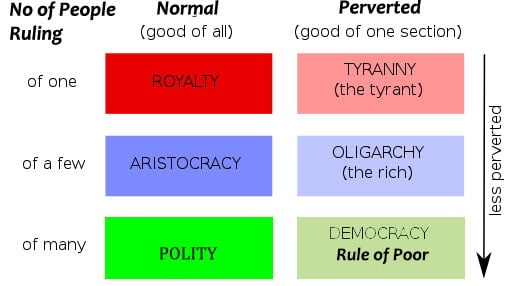
Source: Wikimedia Commons
If we look at his classification of government, the monarchy is the best form of government. Aristotle rejects monarchy because it is not practicable to find out the philosopher-king. The practicable form of the monarchy will be tyranny. Tyranny is the worst form of government according to Aristotle.
Polity is the rule of the middle classes. The rule of many but not so many which is democracy. Democracy is the second-worst form of government described by Aristotle as the rule of many ignorant poors.
Aristotle believes in the principle of “Golden mean”. He does not prefer to sacrifice good for the sake of the best because the best is unachievable. Hence, he goes by suggesting not the best but the best practicable form of government. Aristotle differed from Plato in his approach. Plato was a perfectionist, whereas Aristotle believed in principles of “Golden mean”.
We can see the application of the principle of “Golden mean”. Polity is the golden mean of oligarchy and democracy. Aristotle is following reasons against the rule of the rich (oligarchy) and rule of poors (democracy).
According to Aristotle, the rule of rich and rule of poor are inherently unstable. It is because the poor do not trust the rich, and the rich do not trust the poor. So they will conspire against each other. This way, both rich and poor are inclined to commit crimes. Rich because of arrogance, and the poor because of ignorance.
But both rich and poor will trust the middle class. Hence middle class that has average wealth is more disciplined and has a reason. This way, the polity is the best form of government.
We should not interpret Aristotle literally and criticize him for excluding the poor. We must understand the point Aristotle is trying to make. He is suggesting that extreme inequalities of income and wealth in any society are not conducive to stability. The State cannot leave large sections of society in the state of poverty. There is a need for upliftment for the poor. If more and more people are in the middle class, it will be better.
Theory of Revolution
Aristotle had studied constitutions of his time and earlier times. He gave his theory. Aristotle favoured stability. He has given a detailed analysis of the causes of revolution and measures to prevent it. He has given general causes and regime specific causes. The most common cause behind revolutions is the feeling of inequality, real or imagined.
The general causes given by him are lack of discipline among public officials, high-headedness of the ruling class, state rewarding those whom people consider being unworthy, universal passion for power and privileges, too much influx of foreigners, state neglecting small changes, the rivalry between people of different classes, liking for change among people, and so change is inevitable.
Regime-specific changes are family feuds when someone in the family aspiring to be the king (monarchy). Oligarchy is poor people conspiring against the rich. Democracy is the rich conspiring against the poor.
He even gave solutions to manage the revolutions. He suggests that the State should cultivate the spirit of obedience to law and education among people. Also, the State should address corruption and moderate its use of power.
Theory of Law
“The law is a reason, free from passion“
Aristotle
The above statement is in the context of Aristotle’s criticism of the institution of the philosopher’s king. Plato has given absolute powers to the philosopher-king as they are the embodiment of knowledge and sacrifice. For Plato, no law or ordinance is mightier than knowledge.
Though reason dominates philosopher-king, he has an appetite. Philosopher-king’s appetite may dominate his reason.
Aristotle disagrees with Plato and suggests that the rule of law is preferable over the rule of a person. For Aristotle, law and reason are the same, and the purpose of both is to guide man as to what is right and wrong.
Aristotle says that law is coming to us for ages that makes it time tested institution. Moreover, the law represents collective wisdom that is preferable over the wisdom of one person.
The theory of rule of law reflects Aristotle’s perspective. Aristotle does not go for the best rather prefers the best practicable. The rule of philosopher-king is the best but rule of law is the best practicable form of government. Later Plato also accepted the limitation of his theory of philosopher-king.
Aristotle is known as the greatest disciple as well as the greatest critic of Plato.
“The whole is more than the sum of its parts“
Aristotle
The State as the family of families
Plato looks at the State as a family. The way members of the family obey the will of the father, members of the State are supposed to follow the dictates of the ruler. Aristotle is questioning this.
According to Aristotle, there is a difference in the authority of statesman and the authority of the father. A state is not a family but a family of families. The better way of making laws is when people representing different interests come together and enter into the process of deliberations. Laws of State represent diverse intent to achieve equilibrium in the society.
“One swallow does not make a summer, neither does one fine day; similarly, one day or brief time of happiness does not make a person entirely happy“
Aristotle
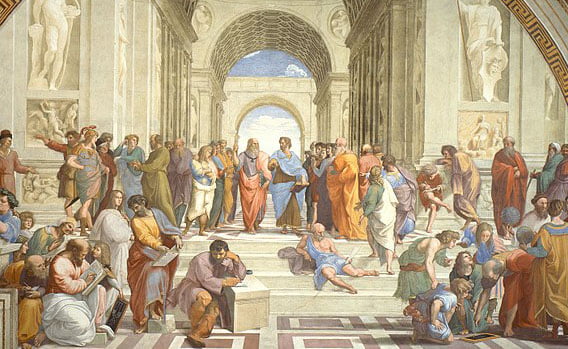
Conclusion
Aristotle belonged to Socratic tradition. He gave preference to the state over self-interest. He believes in natural inequality. Plato divides people into guardian and producer class and Aristotle into masters and slaves. He believes in reason and understands the evils of private property. Aristotle also considers education as the source of virtue.
For the complete article on Plato, click here.
Aristotle is pragmatic in approach and conservative too. He prefers the Rule of Law over the rule of a person. He was also a critic of Plato’s communism of property and family.
He is the originator of many ideas like conservatism and constitutionalism. His book “Politics” can be treated as the first textbook of political science.
“We are what we repeatedly do. Excellence, then, is not an act but a habit“
Aristotle
